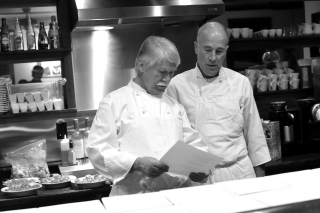
What are the Future Career Tracks for Culinary Graduates?
29 January 2021Anticipate change, prepare for it, and stay ahead of the market that will never slow down for us.
By Paul Sorgule, MS, AAC
Yesterday, today, and tomorrow – there is always a benefit to considering all three when it comes to preparing our students for a life with food. As educators we must reflect on what came before to construct a foundation upon which our students will build a career while learning from the past; stay locked into the needs of today’s industry and know how to adapt those foundations to fit changing environments; and simultaneously think and act years ahead of this moment to lay the groundwork for graduates to define an industry always moving forward.
Yesterday is easy to reflect on because it is documented and tested, today is always a scramble, but we are part of it; but tomorrow is something altogether different. How do we anticipate what will come in the years ahead? There are always indicators and there will always be room for innovators to shape what tomorrow could be – this is where culinary programs and the faculty who teach in them must stand. It is our responsibility to teach, train, and prepare for today and tomorrow.
We know now, more than any other time in recent history, the industry of food will be significantly different in the years ahead. Even without the impact of the pandemic, the signs indicated change was just around the corner. Here are a few things to consider as we take a leap into 2021 and beyond:
Technology will continue to change everything.
We have only scratched the surface when it comes to the impact of technology on our industry. Tomorrow will likely bring changes that we can barely imagine. Think of a challenge we face today and know that technology will be the answer tomorrow. What are we doing to prepare students to adapt? It will go beyond a POS system and a few computerized controls on our cooking equipment. Being technology savvy is an essential skill moving forward.
The labor formula in restaurants must change.
At the core of a restaurants low profitability is the sizeable commitment to many hands. Until restaurants, in particular, become more efficient – profit will always be a dilemma. What are we doing to teach efficiency in planning, preparation, production and service? Being efficient is an essential skill moving forward.
Brick and mortar operations may consider alternatives.
We have learned during the pandemic there are working alternatives that can be effective. A large commitment to physical plant with a stationary requirement to bring customers through the door is costly and unsustainable. An understanding of mobility and virtual work is something we should bring to students. What are we doing in this regard? Mobility and alternative product and service delivery is an essential skill moving forward.
Sanitation and safety will be at the forefront.
This, of course, has always been a hallmark of the food business. It must move beyond the parameters of a course and into the realm of a way to act. Sanitation and food safety will be the most critical skill for future culinarians. The science of safety and the act of food preparation must be one and the same. What are we doing in this regard?
Social media will entirely replace advertising.
Forget your typical marketing class and add social media management to every program. Understanding how to use this tool is as important as learning how to hold a knife. Social media will continue to evolve and will always be a common thread that ties business to consumers. Social media marketing will become an essential skill moving forward.
Analytics will be the key to profitability.
Predictability algorithms, comparative percentages, menu pattern analysis, and customer profile data will be to restaurants and food producers what these same measurements were to professional baseball managers in the movie “Money Ball.” Every culinary student will find statistics and analytical analysis are just as important as food purchasing and menu planning. What are we doing to prepare for this?
The supply chain will be altered.
Purchasing and receiving have always been essential courses. What about developing the skills to communicate effectively with farmers, artisan producers, ranchers and fishermen as the supply chain drifts more and more away from centralized “one stop” vendor relationships? Menu planning is fairly easy when you know you can purchase anything, anytime of the year, delivered whenever you want it. When we start to move more toward “in-season” decentralized purchasing everything becomes far more complex. Standardized product specifications and stable pricing may no longer be as easy to manage. What are we doing to prepare students for this reality?
The key to marketing will be understanding demographic dynamics.
The demographic picture in every state is changing and will continue to do so in the future. Demographics whether ethnicity based, age, family status, economics, or race will become significant factors in determining marketing, product selection, service, pricing, delivery methods, and the make-up of staff. What are we doing to prepare students for a far more complex and diverse public?
What are you doing to prepare your curriculum, faculty, and students for a changing education model, a changing food industry, and a plethora of different career tracks? Take a look at where you are and what you teach. Does it line up with the realities of change that is in the air? Anticipate change, prepare for it, and stay ahead of the market that will never slow down for us.
PLAN BETTER – TRAIN HARDER
Paul Sorgule, MS, AAC, president of Harvest America Ventures, a mobile restaurant incubator based in Saranac Lake, N.Y., is the former vice president of New England Culinary Institute and a former dean at Paul Smith’s College. Contact him at This email address is being protected from spambots. You need JavaScript enabled to view it..
